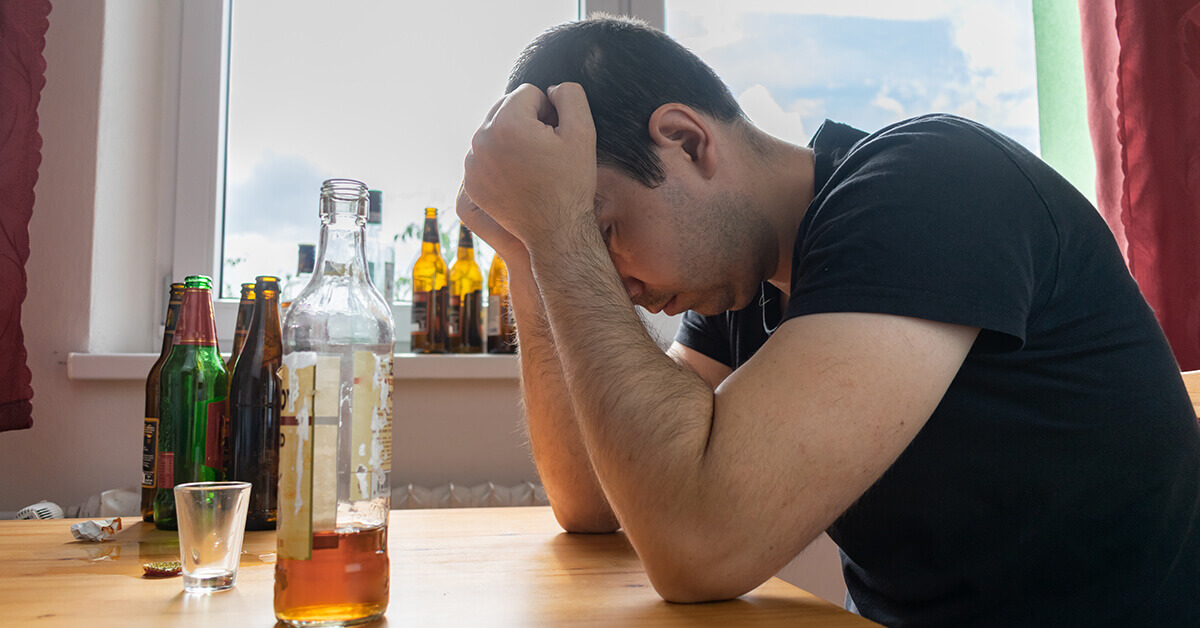Alcohol poisoning is a term you probably recognize, but you may not know exactly what it means. It should not be confused with alcohol intoxication or the state of drunkenness that results from drinking too much alcohol.
Alcohol poisoning is, in fact, a serious and potentially life-threatening condition that occurs when the level of alcohol in an individual's blood exceeds a certain level and starts to cause damage to one's organs.
According to the Centers for Disease Control and Prevention, alcohol poisoning deaths account for about 2,200 deaths each year in the US. But it's not just a problem in the US alone.
The World Health Organization reports that every year nearly 3 million people die from alcohol-related causes. And while the condition is most commonly associated with binge drinking, it can also occur among chronic alcoholics.
How the Body Processes Alcohol
When you consume alcohol, it is absorbed directly into your bloodstream through the lining of your mouth, throat, and stomach.
The alcohol travels in your bloodstream to the liver, where it is metabolized. The liver breaks down alcohol into acetaldehyde, which is then broken down into acetic acid, carbon dioxide, and water.
The liver can process about one drink per hour. The more you consume, the longer it takes for the liver to break down all of the alcohol in your system.

Signs and Symptoms of Alcohol Poisoning
The signs and symptoms of alcohol poisoning include:
- Confusion - inability to think clearly
- Vomiting - this can lead to the person choking on their own vomit if they are passed out or unconscious
- Slow breathing (less than eight breaths per minute) - breathing slows, the gag reflex is suppressed, and the person can choke if they vomit.
- Seizures (jerking movements) - Seizures usually occur because of a high blood level of a substance called gamma aminobutyric acid (GABA) in the brain, which happens when you drink too much alcohol in a short period of time
- Stupor - a state of reduced awareness in which a person is awake but cannot respond or move.
- Decreased coordination - unable to walk steadily, difficulty standing upright (“the drunken sailor syndrome")
- Loss of consciousness - passing out or becoming unconscious
Causes of Alcohol Poisoning
The main cause of alcohol poisoning is binge drinking. That is when people consume alcohol in large quantities over a short period of time.
Alcohol poisoning can also occur in people who drink on an empty stomach, particularly if they drink spirits. This is because hard liquor contains very high concentrations of ethanol (pure alcohol), which is more easily absorbed into the bloodstream than beer or wine.
Risk Factors of Alcohol Poisoning
First, it's important to note that alcohol poisoning can occur at any age, even if you have never consumed alcohol before.
Studies show that alcohol poisoning deaths occur most often among men between the ages of 30 and 60. But it also occurs in women and teens, often because they are more vulnerable to the effects of alcohol.
That said, there are certain factors that can increase your risk of alcohol poisoning. These include:
- Being overweight - The more fat you have, the more vulnerable you are to alcohol poisoning. According to the National Institute on Alcohol Abuse and Alcoholism (NIAAA), people who have a high body mass index (BMI) are at greater risk of alcohol-related problems than people with normal BMIs.
- Drinking more frequently - People who drink every day are at a higher risk of alcohol poisoning than those who drink less frequently. That’s because their bodies become accustomed to processing alcohol, which makes them less sensitive to its effects.
- Consuming other drugs - When you mix alcohol with other substances, such as prescription medications or illegal drugs, you increase your risk of alcohol poisoning.
- Drinking on an empty stomach - If you drink on an empty stomach, your blood alcohol level will rise more quickly than if you have eaten. Drinking on an empty stomach can also make you feel sicker and more likely to vomit when the alcohol hits your system.
- Drinking too fast - If you drink alcohol too quickly, your body may not have time to process it. This can lead to alcohol poisoning.
- Your Health - If you have a history of liver disease or other chronic health problems, you may be at an increased risk of alcohol poisoning.
- Your Age - As you get older, your body processes alcohol differently. This means that older adults may be at an increased risk of alcohol poisoning.
Complications of Alcohol Poisoning
As the adage goes, too much of something is poisonous. When it comes to alcohol poisoning, this couldn’t be more true.
Alcohol poisoning can lead to a number of serious complications that can be fatal if not treated right away. These include:
Seizures and Convulsions
Seizures and convulsions are common complications of alcohol poisoning. Alcohol depresses the central nervous system and can cause seizures, which are uncontrolled electrical impulses in the brain. They can be mild and short-lived or severe and long-lasting.
Seizures can lead to convulsions, which are muscle spasms that cause uncontrolled shaking of the body. Both conditions are dangerous because they disrupt the body’s ability to regulate temperature, heart rate, and blood pressure.
Brain Damage
Brain damage is one of the most severe complications of alcohol poisoning. Alcohol causes brain cells to die or become damaged, which can lead to permanent brain damage.
This can result in memory problems and other cognitive disabilities. The risk of brain damage increases with increased blood alcohol concentration (BAC). The higher your BAC, the more severe the damage will be.
Liver Failure
The liver is the second largest organ in the body and is responsible for many important bodily functions. Liver failure can lead to life-threatening complications, such as anemia, intestinal bleeding, and kidney failure. It can also cause death.
Bear in mind that one of the functions of the liver is to filter toxins from the body. When you drink too much alcohol, the liver can become overwhelmed and unable to keep up with its normal function. This can lead to liver failure, which can be fatal.
Heart Failure
Alcohol causes the heart to enlarge and become less effective at pumping blood throughout the body. This can also cause irregular heartbeats, which can lead to an increased risk of stroke or cardiac arrest.
Hypothermia (Low Body Temperature)
Hypothermia is a serious medical condition that occurs when the body temperature drops below 95 degrees Fahrenheit (35 degrees Celsius). It can lead to death if not treated immediately. Alcohol can cause hypothermia by increasing blood flow to the skin, which cools your body down and reduces its ability to produce heat.
Severe Dehydration
Dehydration is a serious condition that occurs when the body loses more fluid than it takes in. This can happen when you drink too much alcohol or perspire heavily while drinking, which causes your body to lose water and electrolytes (substances such as sodium). Severe dehydration can be fatal in some cases.
Coma
A coma is a state of unconsciousness that can happen when the brain is seriously injured, such as by a blow to the head or an overdose of drugs or alcohol. A person in a coma cannot be awakened and does not respond to pain or other stimuli.
It's not common for alcohol poisoning to cause a coma, but it can happen if a person has severe alcohol poisoning.
Treatment for Alcohol Poisoning
The treatment for alcohol poisoning depends on the severity of the symptoms. In most cases, a person with mild alcohol poisoning will recover without treatment. This can happen if he or she vomits before passing out. In this case, the vomiting will eliminate some of the alcohol from the stomach. He or she may then wake up feeling sick but okay.
If a person with moderate to severe alcohol poisoning is unconscious and cannot vomit, treatment may be needed to prevent brain damage from lack of oxygen. The treatment may include providing oxygen to the person through a mask or tube.
A doctor may also perform a procedure called gastric lavage, which means washing out the stomach with a solution of water and baking soda. The treatment may also include giving the person an antidote to alcohol poisoning, such as naloxone.
A doctor may also give activated charcoal to absorb any alcohol still in the stomach and help prevent absorption by the small intestine. If a person with alcohol poisoning has stopped breathing, he or she may need CPR (cardiopulmonary resuscitation) immediately.
Treatment will also include giving intravenous (IV) fluids to help prevent dehydration.
What to Do if You Suspect Someone Has Alcohol Poisoning
In the event that you suspect someone has alcohol poisoning, call your local emergency number immediately. You can also take these steps:
- If they are passed out and unresponsive, try to keep them from choking on their own vomit by turning them onto their side;
- Try to keep the person awake by talking to him or her, and that is if they are conscious and responsive;
- If they are vomiting, try to prevent them from lying down on their back until after they are done vomiting;
- Keep the person warm. Most people assume it’s best to strip a person down and cool them off, but this won’t help if they are intoxicated. Instead, wrap them in a blanket;
- If the person is conscious, give them some water, but don't give them food, as this can cause choking or vomiting;
- Don't try to get the person to stand or walk, as this can cause them to fall and hurt themselves;
- Don't try to force them to throw up, as this can cause them to aspirate and choke;
- Don't leave the person alone. If you are in a public place, try to get help from someone nearby and stay with them until emergency personnel arrives.
Alcohol Poisoning Preventative Measures
There are many ways that you can reduce your risk of alcohol poisoning. But before we get into that, it’s important to note that having a drink or two every now and again is not necessarily dangerous. In fact, moderate alcohol consumption has been linked with lower rates of heart disease, diabetes, and other health problems.
However, you need to know how much alcohol is too much. The National Institute on Alcohol Abuse and Alcoholism (NIAAA) recommends no more than one drink per day for women and up to two drinks per day for men. They also recommend that pregnant women not drink at all.
If you’re trying to stop drinking altogether, it may be a good idea to have a conversation with your doctor about how much is too much for you as well as what kind of support they can offer you during recovery.
With that in mind, here are a few tips to help avoid alcohol poisoning.
- Do not drink alcohol on an empty stomach;
- Don't mix alcohol with other drugs or medications;
- Drink water prior to drinking alcohol, as well as during and after;
- If you are consuming alcohol at a party, make sure there is plenty of food available to help absorb the alcohol and prevent it from entering your bloodstream too quickly;
- Drink slowly and only when you are eating so that your body has a chance to process the alcohol before it enters your bloodstream;
- Avoid drinking excessively by stopping at one drink per hour and alternating between alcoholic and non-alcoholic beverages;
- Be aware of how alcohol affects you. If you feel tired, lightheaded, or dizzy after drinking, stop drinking immediately and get some fresh air.
Final Thoughts
Alcohol has for centuries been an integral part of many cultures, providing a way for people to relax and socialize. However, it is also a substance that can be abused and lead to serious health problems or even death if used in excess.
There have been many cases of alcohol overdose, and the effects are devastating. Alcohol poisoning does more than just make you feel sick: It can lead to seizures, unconsciousness, brain damage, and even death.
The only way to avoid alcohol poisoning is to drink responsibly and not too much. It’s also important to know the signs of alcohol poisoning so that you can seek medical help if necessary.







